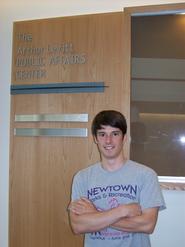
In the current economic climate, obtaining a degree in economics could actually be very profitable as a new economist could make an astounding breakthrough in financial theory. Daniel Bunger ’11 is one of these students whose studies could catapult him into a successful career. This summer, he is researching co-operative banks with the Irma M. and Robert D. Morris Professor of Economics Derek Jones.
His research is funded through the Levitt Research Fellows Program, a program designed to enhance student research around issues of public policy.
Co-operative banks are alternatives to commercial banks, which are privately owned and supported by joint-stock investments. The only relationship most investors have with commercial banks is that they are invited to vote for board members and managers. The bank runs on the basis of making profit for the owners. In addition, commercial banks make notoriously low profits and management receives extremely low wages.
But Bunger says that commercial banks may not be the best for the country’s welfare. The International Monetary Fund published a study that concluded that financial co-operatives, as opposed to commercial banks, are a stabilizing force in a country’s financial system. This is due to their lower earning volatility (to what degree their earnings fluctuate), which makes them less prone to a solvency crisis. Solvency describes cash flow and a company’s ability to pay off its debts. In a co-operative bank, the investors act as members and even owners of the bank. The purpose is to benefit the investors as much as possible. Under this system, banks would extend to rural areas, demonstrating their taste for accessibility rather than just profit.
To conduct his research, Bunger is outlining risk profiles of different banks, their financial and capital structures, and their efficiency. A question that continues to bother Bunger is how and why differing organizational forms behave differently during rough times.
So far, he has found that in the United Kingdom and Canada, co-operative banks are more common and also have high survival rates. Credit unions, a type of financial co-operative, are performing better, and recover more quickly from destabilizing blows. Bunger’s next step is to determine the extent to which the United States and should encourage this change. His research will focus on the U.S. and Canada. Bunger says this kind of analytical thinking is what he likes about economics.
“I think economic is the type of thing where you either get it or you don’t,” he said. “And for me, I really understand it because it works with the way I think.” His grandfather is an economics professor and his father works in finance, which could have contributed to an early inclination for money-related subjects. After Hamilton, Bunger plans to attend graduate school for economics.
His research is funded through the Levitt Research Fellows Program, a program designed to enhance student research around issues of public policy.
Co-operative banks are alternatives to commercial banks, which are privately owned and supported by joint-stock investments. The only relationship most investors have with commercial banks is that they are invited to vote for board members and managers. The bank runs on the basis of making profit for the owners. In addition, commercial banks make notoriously low profits and management receives extremely low wages.
But Bunger says that commercial banks may not be the best for the country’s welfare. The International Monetary Fund published a study that concluded that financial co-operatives, as opposed to commercial banks, are a stabilizing force in a country’s financial system. This is due to their lower earning volatility (to what degree their earnings fluctuate), which makes them less prone to a solvency crisis. Solvency describes cash flow and a company’s ability to pay off its debts. In a co-operative bank, the investors act as members and even owners of the bank. The purpose is to benefit the investors as much as possible. Under this system, banks would extend to rural areas, demonstrating their taste for accessibility rather than just profit.
To conduct his research, Bunger is outlining risk profiles of different banks, their financial and capital structures, and their efficiency. A question that continues to bother Bunger is how and why differing organizational forms behave differently during rough times.
So far, he has found that in the United Kingdom and Canada, co-operative banks are more common and also have high survival rates. Credit unions, a type of financial co-operative, are performing better, and recover more quickly from destabilizing blows. Bunger’s next step is to determine the extent to which the United States and should encourage this change. His research will focus on the U.S. and Canada. Bunger says this kind of analytical thinking is what he likes about economics.
“I think economic is the type of thing where you either get it or you don’t,” he said. “And for me, I really understand it because it works with the way I think.” His grandfather is an economics professor and his father works in finance, which could have contributed to an early inclination for money-related subjects. After Hamilton, Bunger plans to attend graduate school for economics.
Posted July 31, 2009
